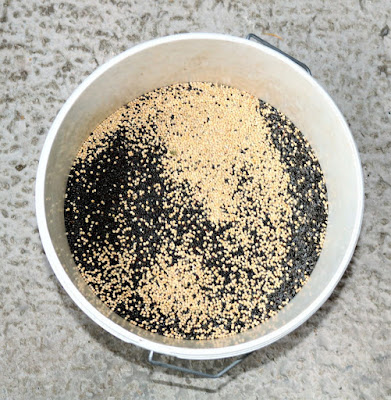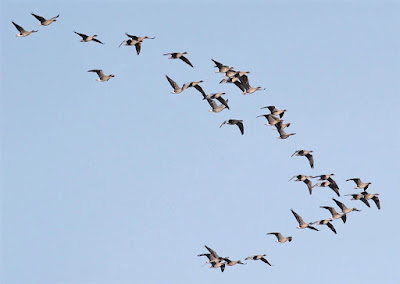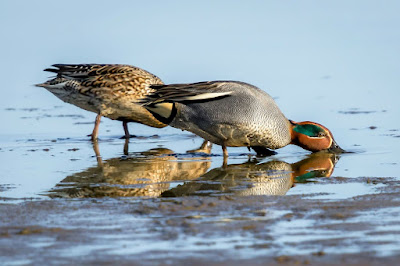Avian Flu still rules in this part of Lancashire where bird ringing remains verboten until sometime never. Avian Flu also made the TV News headlines as an afterthought. Yet another panic story, as if there aren't enough to scare everyone witless and to place lives and normal freedoms on hold.
Those temporary restrictions don’t stop a little bird watching or even topping up seed at supplementary feeding stations when suitable precautions are taken to minimise any spread of infections.
On Friday the mission was to seek, find and to count birds at both feeding stations and then to add some variety to the birds’ everyday food. A bucketful of rape seed, Niger and white millet gets them coming back for more, especially once temperatures dive and overnight frosts make natural seeds unpalatable.
Supplementary Bird Food
The wind dropped overnight and left a touch of frost, but not enough to freeze shallow ditches and dykes.
There’s a bonus to the avian flu because for now shooting in the 10km zone is also prohibited, which means that our coastal geese and wild fowl have a temporary reprieve from becoming a Christmas platter.
A number of large skeins passed over, a constant flow of noise above, in all several hundreds, maybe 4/5000 thousand.
Pink-footed Geese
Geese leaving their overnight roost are especially noisy, a constant conversation of shrill doggish yaps from each and every bird to their immediate neighbours in the line, perhaps a relative, a sibling or a parent. If only we could learn goose talk we might listen in to where they are heading, where are the best meals safe from disturbance, prying eyes and the threat of guns.
And why do geese fly in V formation? Scientists have determined that the V-shaped formation that geese use when migrating serves two important purposes. First, it conserves their energy. Each bird flies slightly above the bird in front of them, resulting in a reduction of wind resistance. The birds take turns being in the front, falling back when they get tired. In this way, the geese can fly for a long time before they must stop for rest. Birds that fly alone beat their wings more frequently and have higher heart rates than those that fly in formation. It follows that birds that fly in formation glide more often and reduce energy expenditure.
The second benefit to V formation is that it is easy to keep track of every bird in the group. Flying in formation may assist with the communication and coordination within the group. Pilots of fighter aircraft often use this formation for the same reason.
Our morning goose flights can last for hours for anyone minded to watch. This is a daily winter occurrence, background noise to which Joe Bloggs becomes accustomed and immune.
I too took my eyes off the geese and looked to the job in hand while the geese continued their morning mission inland.
At our erstwhile ringing plot I found 130+ Linnets and a couple of Chaffinches. It was just as well I concentrated on a count because on the extremes of the Linnet flock a tail-wagging Stonechat flicked into view. And along the ditch were the ubiquitous Wren, a Blackbird and the ever present Reed Bunting, a wintering species that relies on animal food during the summer months but switches to a seed diet in the winter.
A couple of hunkered down Snipe flew from beneath my sploshing feet, the grass wetter and the water deeper than first appeared; my wellies had been a wise choice.
The pool nearby held 20 or more Teal, an approximate count as a handful or more remained partly hidden. A single Grey Heron and a solitary Little Egret stayed in the trees as I looked from 50 yards away.
Teal
Rain arrived from the west with immaculate timing - my appointment with BT. Another Bird Blog goes Fibre Broadband in 2022. There’s no stopping us now.
Linking this weekend to Eileen's Blogspot and Anni in Texas.







Hello Phil,
ReplyDeleteThe Avian Flu does cause panic. I would feel awful if my feeding the birds caused the infection to spread. We had a scare in the Mid Atlantic last spring and were told to put away our feeders. I never put my feeders back up, I do miss feeding the birds. Great captures of the geese in flight, the Reed Bunting is a beauty. I have always loved the Snipe, such a cool looking bird. The Teal is a pretty duck, I hope to see some winter ducks here soon. Thank you for linking up and sharing your post. Take care, have a happy weekend!
Thank you for the information on the V flight formation. Very clever adaptation. Some great shots! Sad about Avian flu.
ReplyDeleteHow amazing to see so many geese! WOW! We hear and see quite a few Sandhill Cranes fly over and they sure make a racket. We heard some yesterday. I'm sorry about the Avian Flu too...so many problems in the world. But good things too so I'll stop with that! lol
ReplyDeleteThankyou for the info Phil, I don't get out as much as I used to especially in this weather but it is good to read other peoples info and see their pictures. Take care with all thats going on.
ReplyDeleteMike.
I think Pilling looks wonderful, a very nice looking frosty photograph.
ReplyDeleteEnjoyed seeing your bird sightings.
Enjoy the rest of your weekend.
All the best Jan
What a terrific read. Enjoyed the scientific theory of geese in flight. Terrific photos. Now I wonder just what causes bird flu and an it be prevented somehow. I will research this in more depth.
ReplyDeleteThank you so much for sharing your photos & narration this week.
enjoyed this post - could you give more info on the bird flu? does it kill a lot of birds? is it highly contagious between birds? can it pass to humans? can humans spread it? I don't think I've ever heard of it here in the US. Poor birds. I know that deer in Michgan were reportedly getting COVID last summer and some were put down and people were warned to stay away from deer. My sister went next door to warn her neighbor as she likes to feed deer.
ReplyDeleteWe had problems here with songbirds being stricken - for several months we were urged not to put out bird feeders. Not sure precisely what the issue was. Fortunately our back yard remained full of our feathery friends.
ReplyDeleteThanks for sharing at http://image-in-ing.blogspot.com/2021/12/memories-of-snows-gone-by.html
Interesting to learn about the V formation. Favourite shot is the snipe.
ReplyDeleteI found two sick birds in my feeder last year and had to take it down for two weeks. The longest two weeks I've ever waited :) You've seen quite a few birds for your day, and have many very nice photos of your adventure.
ReplyDeleteThe avian flu is coming and going here as well, just like other viruses.
ReplyDeleteLovely burds and plow! The noisy plows ot the greylag goose is the sign of Spring arriving and Summer going here.
Phil - thank goodness for bloggers or I would be unaware of important world events! I did not know Avian Flu was back, nor am I aware of a connection to bird feeders. I will have to do some reading on this ... love your photos, especially the Snipe.
ReplyDeleteBeautiful shots! The warm sun gives such nice light!
ReplyDeleteHi Phil! That's really interesting about the V formation of the geese. I always wondered about that. Seeing the photo of your Reed Bunting reminded me to tell you I saw a bunch of Snow Buntings while driving the other day. They hang out at a local farm. I have yet to get good photos of them, but I'm trying!!! ☺
ReplyDelete